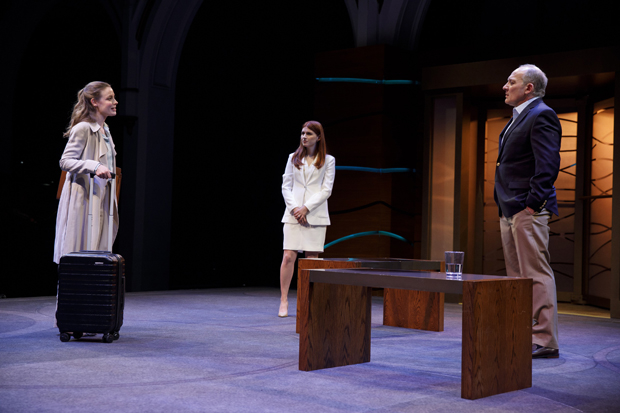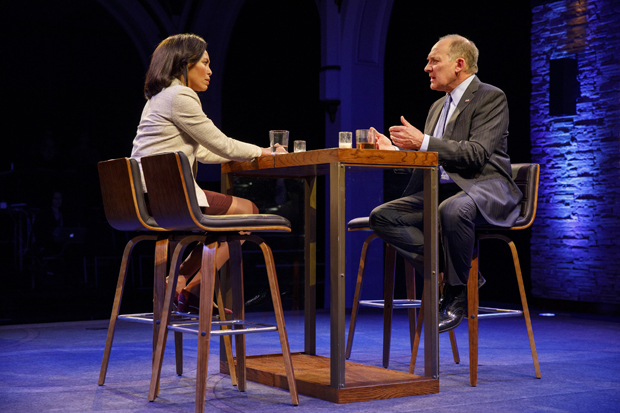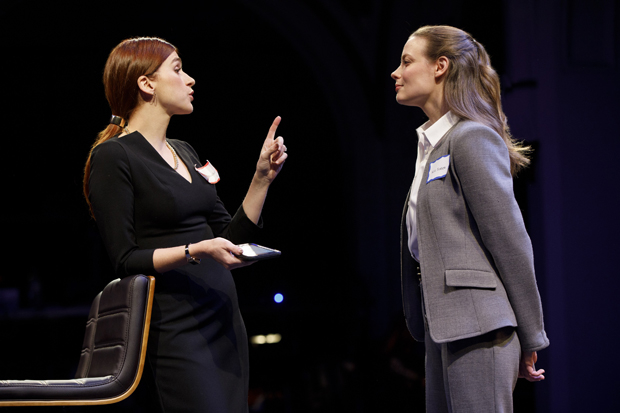Politicians Are Bought and Sold by America's Real Lawmakers in Kings
The people with the gold make the rules in Sarah Burgess’s latest play.

(© Joan Marcus)
A large majority of supporters of both parties agree that money holds too much sway over politics, and politicians are mostly in it for themselves. This is not a controversial point. Playwright Sarah Burgess explains why this view prevails in Kings, her new play about the cozy relationship between corporate lobbyists and our elected representatives. Now making an exciting but messy world premiere at the Public Theater, this provocative drama affirms our cynicism without resorting to the conspiratorial thinking of other recent stage efforts.
According to Burgess, Washington isn't run by scotch-swilling powerbrokers, but perma-smile-wearing lobbyists on an endless fundraising circuit. Lauren (Aya Cash) and Kate (Gillian Jacobs) are two such swamp dwellers. We first meet them on a fundraising ski weekend in Vail, Colorado. Both are mystified by Sydney Millsap (Eisa Davis), a Texas war widow who won her seat in a special election. She hasn't left her hotel room to glad-hand and routinely turns her nose up at proposed meetings with wealthy donors. She also resents the hours her party makes her spend on the phone begging the rich for money, especially since the rich expect their legislative priorities to be entertained in return. To everyone's shock and dismay, she calls this behavior exactly what it is: corruption.

(© Joan Marcus)
This is in stark contrast to Senator John McDowell (an avuncular Zach Grenier). He has held his seat for decades and knows how the game is played. He's a favorite to be president, and Lauren knows there is a job for her in his administration: She used to be his chief of staff before becoming a finance lobbyist who earns a $100,000 bonus for every year the Senator stays in office. Sydney is horrified when she learns this, but Kate tries to explain that this is just how things are run; or, as Lin-Manuel Miranda eloquently puts it in Hamilton, "how the sausage gets made."
Hamilton director Thomas Kail helms the production, as he did with Burgess's last show at the Public, Dry Powder, which took similar aim at the world of private equity. A subplot in Kings about the carried interest tax loophole makes the two plays excellent companion pieces. Kail leads the cast to performances that elucidate the script's wonkery, although several line fumbles hint at significant recent script revisions.
Set designer Anna Louizos visualizes Washington's revolving door by literally putting a revolving door on the traverse stage, which is buttressed by the kind of faux-expensive woodwork and masonry one might find in a midlevel hotel lobby. Black-clad stagehands shuffle around between scenes rearranging the furniture to create various restaurants and conference rooms, but the set pieces are so minimal that these transitions feel like unnecessary speedbumps. Kail tries to power over them with flashing neon lights (by Jason Lyons) and a dance remix of fundraising calls (by Lindsay Jones), but the gimmick wears thin after the first few scenes.

(© Joan Marcus)
While the physical production underwhelms, Kail and his cast excel in crafting characters and relationship that feel genuine. Davis gives a particularly stirring portrayal of Sydney, and many will leave the theater wishing she were a real candidate. She's perceptive, honest, and just a little naive. Dishearteningly, every other character verbally reminds her that she is the first woman of color to represent her district, letting us know that they value her identity over her ideas.
Through nuanced body language and vocal inflections, Jacobs and Cash establish their characters' relationship from the very beginning, making us aware of the soft domination Lauren exerts over Kate (and against which Kate rebels). It feels an awful lot like a toxic high school friendship. As we slowly discover that every other K Streeter went to the same handful of Ivy League universities, we come to understand that Washington actually resembles Means Girls more than The Parisian Woman.

(© Joan Marcus)
Yet even as Burgess excoriates America's blinkered Brahmin class, with its passive-aggressive manners and tragic lack of imagination, she makes their rigged game seem quite understandable. You would have to be pretty deluded to think that you could completely resist the little ethical compromises that mark modern political life, or that you do resist their parallels in your own corner of the world. Kings is not just an exposé of Washington corruption, but a meditation on the myths we all tell ourselves so we can go to sleep at night. Mercifully, Burgess leaves us with just enough hope that when we finally do wake up, we can drag ourselves out of bed and get to work.










